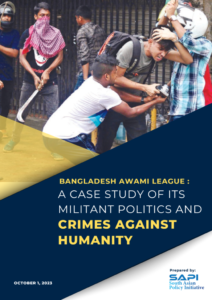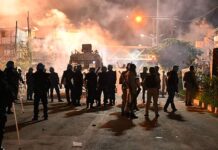Bangladesh Awami League: A Case Study of its Militant Politics and Crimes Against Humanity
This report serves to compile and document the extensive history of violent political crimes committed by Bangladesh Awami League (hereinafter referred to as “BAL”) and its affiliated organizations. The BAL, being one of the largest political parties in Bangladesh and the incumbent ruling party, has been involved in a wide range of heinous acts, including murder, torture, vandalism, looting, robbery, abduction, gang rape, and targeted attacks on minority groups. It is important to acknowledge that these crimes, as outlined in Article-7 of the Rome Statute, constitute as crimes against humanity. By highlighting these atrocities, the report aims to draw attention to the gravity and systematic nature of the offences committed by the BAL.
The objective of this report is to investigate whether these criminal practices have been deeply ingrained in the ideology and psyche of the BAL since its inception. The compilation of reports and factual evidence makes it apparent that despite operating as a major political party in Bangladesh, the BAL functions more like a terrorist organization. Evidence suggests that these criminal activities have persisted since the party’s establishment in 1949, with a notable intensification of violence during the autocratic rule of BAL’s all-time supreme leader and ideological lord, Sheikh Mujibur Rahman, after Bangladesh gained independence in 1971. Reports from that period describe a society plagued by fear and violence, with rural populations becoming refugees due to the actions of party cadres.
Bangladesh achieved its sovereignty in 1971, yet its potential as a developing country has not been fully realized despite abundant economic opportunities. Violent and unlawful interventions of the BAL have been one of the major hindrances that impede the flourishing of the rule of law and functional democratic institutions. The country is presently confronting an alarming surge in violence, criminal activities, and human rights violations, primarily involving individuals associated with the ruling party, the BAL, and its affiliates. This report aims to draw attention to these urgent issues and provide valuable insights to those capable of contributing towards restoring accountability. It also offers guidance on effective measures to address the situation and foster positive change.
This report also critically looks into the direct involvement of affiliated organizations, individual leaders and policymakers associated with the BAL in Bangladesh, investigating their potential engagement in crimes against humanity. The party’s violence and criminal activities have intensified over time, with the period spanning fourteen and a half years (2009 – 2023) under Sheikh Hasina’s rule being particularly the most brutal in the country’s recent history. However, it should be noted that the scope of this study does not cover the atrocities committed by state apparatus while the BAL has been in power. Instead, it mainly focuses on the crimes against humanity perpetrated by the BAL as a political party.
Furthermore, the study unveils the involvement of BAL members in attacks on ethnic and religious minority communities in Bangladesh. These attacks are often motivated by financial gains or a deliberate agenda to seize the properties of the targeted individuals or communities. Such attacks have been widespread on a large scale throughout the country, facilitated by a pervasive culture of impunity where members of the party and its affiliates evade accountability and deny access to justice. This alarming situation occurs within the context of a shift towards one-party rule, demolishing the democratic institutions and undermining the democratic principles that should prevail in the country.
While this study draws upon credible reports from reputable media outlets and other primary sources, it is essential to note that the absence of press freedom in Bangladesh may have resulted in many incidents going unreported. The 2023 media freedom report of Reporters Without Borders highlights the concerning state of press freedom in Bangladesh, placing it at the lowest position in South Asia. With a ranking of 163rd out of 180 countries, limitations on media independence could have hindered the full extent of information available for this study.
The study was conducted in 2023 by the SAPI research team under the supervision of Dr Mahmudur Rahman, with Shibly Sohail as the chief researcher. It employed robust methodology, collecting data from credible secondary sources, verifying it through cross-checking and addressing biases, and performing qualitative analysis. Limitations included restricted access to primary data, potential biases in secondary sources, and challenges in accessing older reports.










